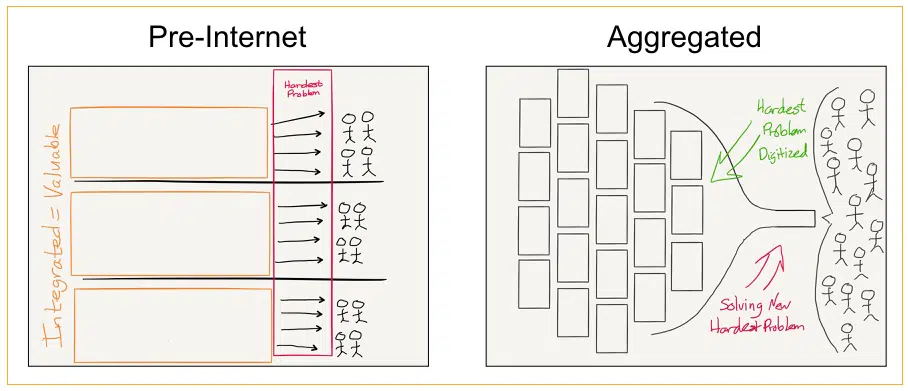TL;DR
Today, consumers are overwhelmed by choice. ‘Aggregators’ help curate this choice and own demand by doing so better than anyone else.
But AI is intelligence, and intelligence creates things. Products, services, songs, movies, experiences, you name it. There will be orders of magnitude more choices than there are today.
So what’s a human to do?
Just like Google, Amazon, and Netflix brought order to the explosion of choices that came with the internet, something new will emerge that owns consumer demand in the age of AI.
The age of the internet: Best experience wins
The internet gave rise to the aggregators: today’s behemoth consumer tech companies, best explained by Ben Thompson’s insightful Aggregation Theory.

But AI is changing everything 🤯
The age of AI: Best data = best experience wins
This new era of AI is giving rise to something else. While aggregators curate options (e.g., 10 blue links, movies you may like, products based on your searches, etc.), AI goes further. It gives the answer.
This is harder to monetize in the current model. If answers are sponsored, is it really the best answer? And if you give the best answer + some sponsored options, isn’t that just a version of what Google does (which is getting replaced)?
A better approach is to always give the right ‘answer’ no matter what (credibility), and be ubiquitous to the extent that you get a % of every monetizable transaction by default.
But that’s still not quite right. Because ‘answer’ implies there’s a question. But why will people even have to ask?
Let’s take a step back…
Today, the biggest consumer AI companies are building ‘answer engines’ as chatbots to replace Google. They are indeed leading the charge by solving important problems, building the foundational models, and introducing the masses to AI.
But they will find that it’s quite hard to monetize once ‘good enough’ models are commoditized. And even if they ‘win’ that race, their approach won’t be the best way to capture the most valuable transactions (commerce).
In a way, these answer engines are the ‘internet portals’ of today. They are an early, suboptimal implementation of an innovative tehcnology that doesn’t fully take advantage of what the new technology uniquely enables.
What’s after search? 🤔
People will always have questions, most of which will have low monetization answers (e.g. Wikipedia).
But the highest value isn’t in the question, it’s in the decision: I’m buying this, not that. Decisions are where the commercial intent is.
Decisions with commercial intent will be made in ever-evolving ways that are more contextual (anticipated), interactive (immersive AR/VR) and collaborative (people like me wear/eat/use things like this).
And we can only do this by knowing people better than they know themselves, which requires quantities and kinds of data that are unfathomable today. But not tomorrow 💡
Who wins? 🏆
The counterintuitive thing is that is that today’s tech giants like Google and Facebook aren’t best positioned to do this. I seems like they should be due to the data and distribution they have, but since it’s in the context of the old model it will lead them down the wrong paths.
The biggest companies of the future won’t get built like the biggest companies of the past. They rarely are.
